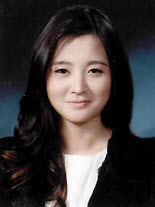
KWON So-youn, a graduate of College of Pharmacy
Seoul National University Graduate KWON So-youn (28, College of Pharmacy) recently had her master’s thesis titled, “Erythrophagocytosis of Lead-Exposed Erythrocytes by Renal Tubular Cells: Possible Role in Lead-Induced Nephrotoxicity” published in Environmental Health Perspectives, one of the world’s leading academic journals. The journal is published by the National Institute of Environmental Health Sciences, a United States government branch maintained by the National Institutes of Health. The thesis appeared in the 2015 February edition and was published as the featured article, ‘News of the month.’
The Environmental Health Perspectives is the only science and engineering journal among 8,500 Science Citation Index journals to be published directly by the United States Federal Government. It carries much weight and prestige in the academic world. Currently it is attracting the attention of the world’s scientific community. KWON So-youn’s thesis to be published as featured article is no small achievement. Even professional academics and researchers find it difficult to get their work published in this journal.
KWON SO-youn’s thesis study investigates the specific relationship between nephrotoxicity (kidney toxicity) and lead poisoning. While epidemiological studies seem to show high correlation between the two, the specific causes of this relationship have not been fully documented. Therefore, the study’s objective was to examine the role of erythrocytes, one of the major lead reservoirs, and their role in lead-associated nephrotoxicity.
Dr. Julia R. Barret, editor of the Environmental Health Perspectives journal, published a complementary article titled, “Seeds of Toxicity? Erythrocytes and Lead-Associated Kidney Damage.” It described the context and findings of the study carried out by KWON So-youn and her peers:
“Current evidence suggests that kidney damage can occur at blood lead levels as low as 5 μg/dL.2 Specific populations, including people with preexisting kidney disease, diabetes, or hypertension, may be at even greater risk of effects of low-level lead exposure… Both in vivo and in vitro data highlight oxidative stress as a factor in lead-associated kidney damage, but it has been unclear how the stress is generated.”
Professor CHUNG Jin-ho, a professor in the College of Pharmacy at Seoul National University, and coauthor of the study stated, “The ultimate biological outcome of toxic exposures is frequently a combination of two factors—individual responses of multiple tissues and, subsequently, complex interactions of altered tissues… we considered that lead-associated nephrotoxicity must be interpreted in the context of systems biology, rather than as sole and isolated damage to the kidney.”
Dr. William McClellan, a professor of medicine at Emory University, observed: “I have a feeling that if they come up with comparable findings, there will be some strong interest in doing some human studies.”
KWON So-Youn, who completed her masters in the College of Pharmacy under Professor CHUNG Jin-ho in 2013, is currently employed at Samsung Bioepis. Regarding the publication she commented, “It is a great honor to me. I'm honored not only to publish my study as the master's thesis in the Environmental Health Perspectives journal which is a journal of authority but also to be selected as ‘News of the month’. I really appreciate all the seniors who have helped me a lot and appreciate my academic advisor, Professor CHUNG Jin-ho.”
For more information about her work, see the Environmental Health Perspectives Journal:
“Seeds of Toxicity? Erythrocytes and Lead-Associated Kidney Damage”: http://ehp.niehs.nih.gov/123-a42/
“Erythrophagocytosis of Lead-Exposed Erythrocytes by Renal Tubular Cells: Possible Role in Lead-Induced Nephrotoxicity”: http://ehp.niehs.nih.gov/1408094/
Written by JUN Taehoon, SNU English Editor, taehoonjun@snu.ac.kr
Reviewed by Eli Park Sorensen, SNU Professor of Liberal Studies, eps7257@snu.ac.kr

